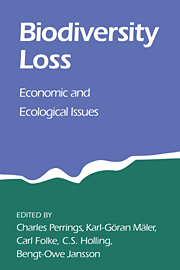Book contents
- Frontmatter
- Contents
- Foreword
- Preface
- List of contributors
- Introduction: framing the problem of biodiversity loss
- PART I CONCEPTUALISING DIVERSITY AND ECOSYSTEM FUNCTIONS
- PART II INTEGRATING ECOLOGY AND ECONOMICS IN THE ANALYSIS OF BIODIVERSITY LOSS
- PART III ECONOMIC ISSUES
- PART IV CONCLUSIONS
- References
- Index
Introduction: framing the problem of biodiversity loss
Published online by Cambridge University Press: 05 June 2012
- Frontmatter
- Contents
- Foreword
- Preface
- List of contributors
- Introduction: framing the problem of biodiversity loss
- PART I CONCEPTUALISING DIVERSITY AND ECOSYSTEM FUNCTIONS
- PART II INTEGRATING ECOLOGY AND ECONOMICS IN THE ANALYSIS OF BIODIVERSITY LOSS
- PART III ECONOMIC ISSUES
- PART IV CONCLUSIONS
- References
- Index
Summary
Identifying the problem in biodiversity loss
Of the two global environmental “problems” currently attracting almost obsessive popular interest, climate change and biodiversity loss, it is climate change that has dominated both the scientific and the policy agenda. The resources currently committed worldwide to both research on and mitigation of the causes of climate change all but eclipse the resources committed to biodiversity loss. If this fairly reflects the relative importance of the two problems it is difficult to avoid one of two conclusions. Either the social cost of biodiversity loss is trivial compared to the cost of climate change, or the return on resources invested in biodiversity conservation is much lower than the return on resources invested in arresting climate change. Either popular concern over the loss of biodiversity is misplaced, and the dire predictions of some of the world's best known biologists are not to be taken seriously, or the scope for reducing the social costs of biodiversity loss is small.
This volume considers just what is at issue in the problem of biodiversity loss. It does not engage in popular debate, nor does it enter the lists in the ranking of environmental problems. But it does ask questions that are central to the popular debate, and it does reach conclusions that cast doubt on the current commitment of resources to the biodiversity loss.
- Type
- Chapter
- Information
- Biodiversity LossEconomic and Ecological Issues, pp. 1 - 18Publisher: Cambridge University PressPrint publication year: 1995
- 12
- Cited by



